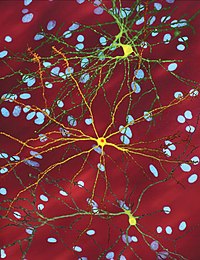
Photo from wikipedia
ABSTRACT Introduction Persons with military involvement may be more likely to have Parkinson’s disease (PD) risk factors. As PD is rare, case finding remains a challenge, contributing to our limited… Click to show full abstract
ABSTRACT Introduction Persons with military involvement may be more likely to have Parkinson’s disease (PD) risk factors. As PD is rare, case finding remains a challenge, contributing to our limited understanding of PD risk factors. Here, we explore the validity of case-finding strategies and whether military employment is associated with PD. Materials and Methods We identified Adult Changes in Thought (ACT) study participants reporting military employment as their longest or second longest occupation. We used self-report and prescription fills to identify PD cases and validated this case-finding approach against medical record review. Results At enrollment, 6% of 5,125 eligible participants had military employment and 1.8% had prevalent PD; an additional 3.5% developed PD over follow-up (mean: 8.3 years). Sensitivity of our case-finding approach was higher for incident (80%) than prevalent cases (54%). Specificity was high (>97%) for both. Military employment was not associated with prevalent PD. Among nonsmokers, point estimates suggested an increased risk of incident PD with military employment, but the result was non-significant and based on a small number of cases. Conclusions Self-report and prescription medications can accurately identify incident PD cases relative to the reference method of medical record review. We found no association between military employment and PD.
Journal Title: Brain Injury
Year Published: 2022
Link to full text (if available)
Share on Social Media: Sign Up to like & get
recommendations!